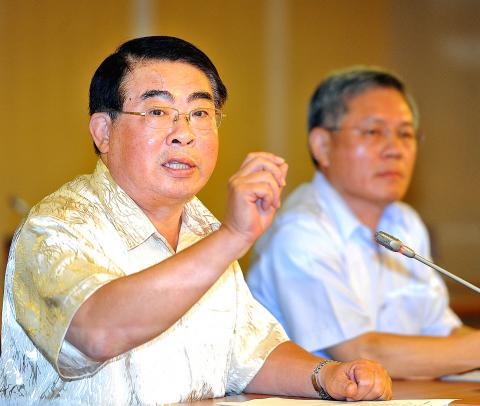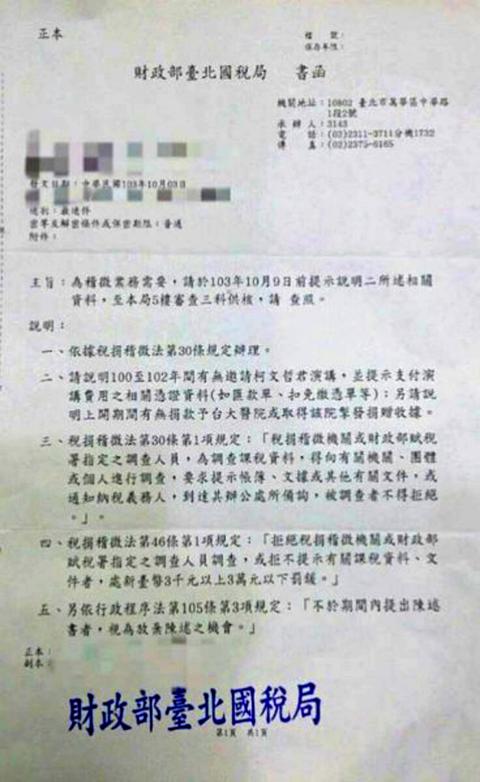Independent Taipei mayoral candidate Ko Wen-je (柯文哲) is under investigation for alleged tax evasion, the National Taxation Bureau of Taipei said yesterday, saying it had ordered several institutions to explain payments they made to Ko for giving speeches in the period between 2011 and last year, a bureau official said yesterday.
Bureau Deputy Director Wang Chieh-chen (王玠琛) confirmed that the Ministry of Finance agency has requested that “several” institutions that invited Ko to deliver a speech over the past three years present evidence to prove they abided by the law when they paid the speaker’s fees, as well as when they made donations to National Taiwan University Hospital (NTHU) while Ko worked there.
Wang did not give an exact figure on the institutions, but said it was in the single digits.

Photo: Fang Pin-chao, Taipei Times
After the Chinese-language Apple Daily published an article on its Web site saying that the Ketagalan Institute — founded by former president Chen Shui-bian (陳水扁) in 2003 as an educational institute for citizens — had received one of the requests made by the bureau, Wang convened a press conference on the matter at 5:30pm.
Declining to reveal who sent the bureau a letter making the allegations, when it was received and what its contents were, Wang said the bureau issued the request to “several” institutes on Thursday, “within two weeks” of being tipped off by an informant or informants.
Wang said the bureau first assessed the claims, finding information online he said indicated Ko could have illicitly received money from the institutions, and then decided to look into the matter.

Wang refused to elaborate on how the bureau concluded that the case was “worth pursuing,” saying: “We found tiny hints [that the claims may be true]. We don’t just run after shadows.”
The institutions were told to present themselves to the bureau before tomorrow.
“We have given them [the institutions] an opportunity to explain themselves. If they can prove legality [of the payments to Ko], the case will be closed,” he said.
Later yesterday, Democratic Progressive Party Legislator Chao Tien-lin (趙天麟) said there were about "five" or "six" institutions involved when he questioned Premier Jiang Ti-huah (江宜樺) during the question-and-answer session.
The Apple Daily later posted a document on its Web site showing that Suncolor (三采文化), the publisher of Ko’s book Power of the White (白色的力量) was involved.
Just one hour after the paper posted the exclusive online, it had been read by more than 12,000 people and attracted more than 100 comments, most of which expressed the view that the bureau’s probe was a smear tactic against Ko, who has been polling well ahead of Chinese Nationalist Party (KMT) rival Sean Lien (連勝文) in several surveys of the Taipei race.
“What a rubbish government this is, using the state apparatus for the KMT’s campaign. Is there any distinction between the party and the government?” one said.
Lin Hsiao-chi (林筱淇), spokesperson for Ko’s campaign office, said the tax evasion probe and pressure exerted by KMT lawmakers on NTHU over its MG149 account — which they say Ko used for illegal activities — have brought the quality of the Taipei mayoral election to “an unprecedented ugly” level.
“It’s regrettable,” Lin said, urging the KMT administration and Lien to stop disturbing civic organizations to attack Ko.
Taiwan Solidarity Union Legislator Yeh Chin-ling (葉津鈴) yesterday alleged that the National Taxation Bureau’s Taipei branch was pressured by KMT Legislator Liao Cheng-ching (廖正井) to launch the investigation.
Yeh said that at a meeting of the legislature’s Finance Committee on Oct. 1, bureau Director Ho Jui-fang (何瑞芳) had promised Liao that the agency would put the case on file for investigation and would get back to Liao in two weeks.
Liao was unable to be reached for a comment.
Meanwhile, separately yesterday, acting KMT whip Alex Fai (費鴻泰) denied a story carried by the Chinese-language United Daily News (UDN) yesterday saying that the KMT had held a party celebrating its success in attacking Ko on the MG149 controversy.
The UDN reported that as the party was greatly satisfied with the result of the “PK team” — allegedly established to wage a smear campaign against Ko — an “after party” celebrating the team’s “achievement” was held on Monday night and attended by KMT lawmakers and Premier Jiang. “PK” stands for “player killer” and is an online gaming term for players who hunt rivals’ virtual characters to kill them, rather than collaborate with others.
Fai last week confirmed the group’s existence, but said its aim was to have KMT lawmakers help the party’s campaign efforts for the nine-in-one elections on Nov. 29.
According to the UDN report, at the party, Fai led a group of KMT lawmakers to toast KMT Legislator Lo Shu-lei (羅淑蕾), who was the first to accuse Ko of corruption involving his use of the MG149 account.
Denying the report, Fai yesterday said there had been a dinner, but it had been scheduled by the Executive Yuan two or three weeks ago and lawmakers of both the ruling and opposition parties had been invited.
Fai also sought to clarify speculation that the PK team was set up at the request of President Ma Ying-jeou, (馬英九), who is also KMT chairman.
“It was I, wishing to integrate the campaigning forces in the face of the nine-in-one elections, who proposed [setting up the team]. I am fully responsible for the operation of the team,” Fai said.
Additional reporting by Alison Hsiao

The US government has signed defense cooperation agreements with Japan and the Philippines to boost the deterrence capabilities of countries in the first island chain, a report by the National Security Bureau (NSB) showed. The main countries on the first island chain include the two nations and Taiwan. The bureau is to present the report at a meeting of the legislature’s Foreign Affairs and National Defense Committee tomorrow. The US military has deployed Typhon missile systems to Japan’s Yamaguchi Prefecture and Zambales province in the Philippines during their joint military exercises. It has also installed NMESIS anti-ship systems in Japan’s Okinawa

‘WIN-WIN’: The Philippines, and central and eastern European countries are important potential drone cooperation partners, Minister of Foreign Affairs Lin Chia-lung said Minister of Foreign Affairs Lin Chia-lung (林佳龍) in an interview published yesterday confirmed that there are joint ventures between Taiwan and Poland in the drone industry. Lin made the remark in an exclusive interview with the Chinese-language Liberty Times (the Taipei Times’ sister paper). The government-backed Taiwan Excellence Drone International Business Opportunities Alliance and the Polish Chamber of Unmanned Systems on Wednesday last week signed a memorandum of understanding in Poland to develop a “non-China” supply chain for drones and work together on key technologies. Asked if Taiwan prioritized Poland among central and eastern European countries in drone collaboration, Lin

Renewed border fighting between Thailand and Cambodia showed no signs of abating yesterday, leaving hundreds of thousands of displaced people in both countries living in strained conditions as more flooded into temporary shelters. Reporters on the Thai side of the border heard sounds of outgoing, indirect fire yesterday. About 400,000 people have been evacuated from affected areas in Thailand and about 700 schools closed while fighting was ongoing in four border provinces, said Thai Rear Admiral Surasant Kongsiri, a spokesman for the military. Cambodia evacuated more than 127,000 villagers and closed hundreds of schools, the Thai Ministry of Defense said. Thailand’s military announced that

CABINET APPROVAL: People seeking assisted reproduction must be assessed to determine whether they would be adequate parents, the planned changes say Proposed amendments to the Assisted Reproduction Act (人工生殖法) advanced yesterday by the Executive Yuan would grant married lesbian couples and single women access to legal assisted reproductive services. The proposed revisions are “based on the fundamental principle of respecting women’s reproductive autonomy,” Cabinet spokesperson Michelle Lee (李慧芝) quoted Vice Premier Cheng Li-chiun (鄭麗君), who presided over a Cabinet meeting earlier yesterday, as saying at the briefing. The draft amendment would be submitted to the legislature for review. The Ministry of Health and Welfare, which proposed the amendments, said that experts on children’s rights, gender equality, law and medicine attended cross-disciplinary meetings, adding that